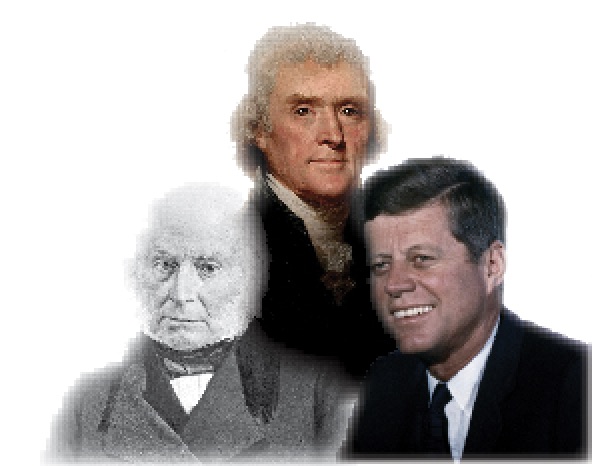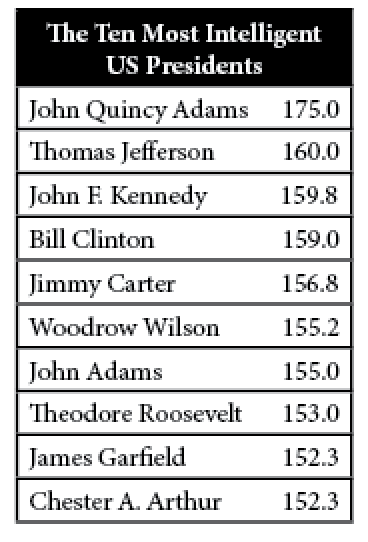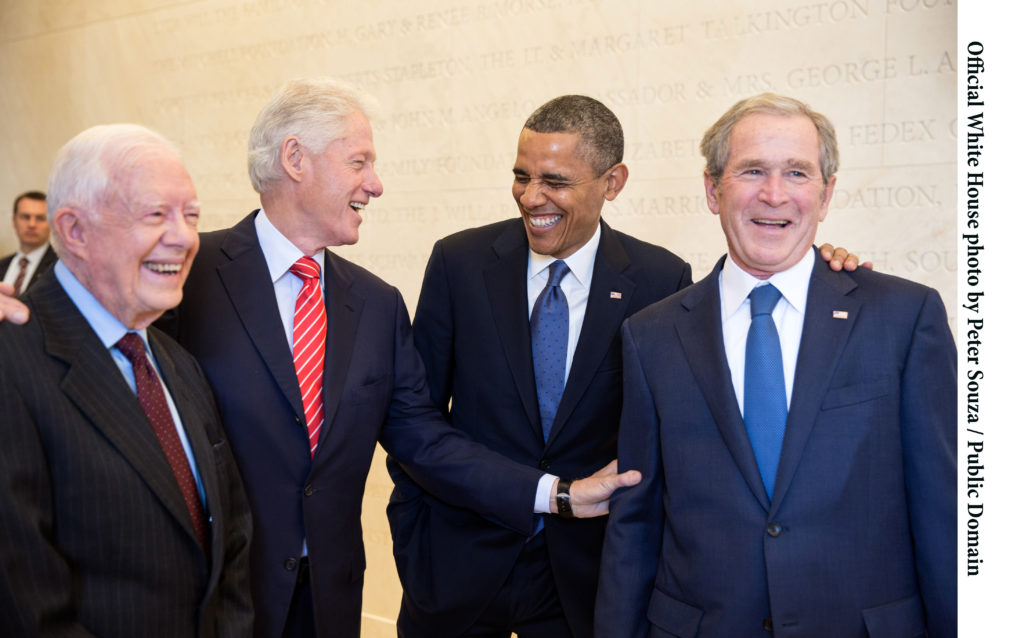
One of the many hotly-debated topics that surfaces on the internet from time to time is the question, “Who was the most intelligent of the 46 U.S. Presidents from George Washington to Joe Biden?” Was it Thomas Jefferson, as suggested by John F. Kennedy? Or was it John Quincy Adams, or Kennedy, himself? Maybe it was one of the lesser known presidents like James Garfield who discovered a proof of the Pythagorean Theorem.. A popular quote attributed to Einstein asserts, “Everybody is a genius. But if you judge a fish by its ability to climb a tree it will live its whole life believing that it is stupid.” However, it would seem that comparing the intelligence of the US presidents, might be a more reasonable task, because it involves comparing men in the same role. In attempting to create a metric for this comparison, it would be necessary to identify the behaviors through which intelligence is manifest, such as creativity, inventiveness, a capacity for deep abstraction, or a soundness of judgment. Not only would it be difficult to assess each of these components, but once assessed, each component would have to be weighted and combined with the other components to yield a single number. Since weighting these factors is highly subjective, the ranking of the presidents by intelligence would vary, depending on the perception of the person or committee creating the metric. Furthermore the assessment of each component of intelligence would have to be inferred from the perceived impact of the individual’s judgment, leadership skills, and decisions. At this point, we merely acknowledge that creating a metric for intelligence is a daunting task, and must begin with a reasonably clear idea of what is meant by “intelligence” in the human species.
In 2006, psychologist Dean Keith Simonton conducted what is called a historiometric study of the 42 US presidents from George Washington to George W. Bush in an attempt to estimate their IQs. Entering data from biographies detailing their educational backgrounds, personality descriptions, intellectual achievements, and accomplishments into a sophisticated software program designed to estimate IQs from such profiles, he ranked them by IQ.
Since many arbitrary judgments are involved in quantifying cognitive characteristics, the specific IQ for any particular president should be taken as a very rough estimate at best. Changing input data by even a small amount would change significantly the estimated IQ. However, the value in this study resides in its comparison of the potential for achievement (IQ) with actual achievement. The table below lists, in descending order, the 10 presidents with the highest estimated IQ. Many presidents, like Washington at 20th (est. IQ 132.5) and Lincoln at 12th (est. IQ 140) who are not on this list, achieved significantly more than several who made the top ten, suggesting that performance in a role is not dependent on IQ alone. Simonton states, “Intellect is not, by any means, the only predictor of presidential leadership. Many other variables are involved as well, including both personality traits and situational factors.”

The difficulty in estimating the IQs of the US Presidents was evident in Simonton’s study. Every US President had an estimated IQ of 130 or greater, placing them all in the top 3% of the general population in intelligence. For example, the estimate for the IQ of George W. Bush was 138.5, placing him in the top 0.9% of the population, but lower than most US Presidents. However, Simonton acknowledging the fragility of such estimates stated:
George W. Bush may be much smarter than [our estimate] implies. The counterargument must aim at the score he received on Openness, a score that provided the only information for the imputation of his IQ and Intellectual Brilliance estimates.
In the photo below, Jimmy Carter, Bill Clinton, Barack Obama, and George W. Bush share a moment of levity as they wait backstage before the dedication of the George W. Bush Presidential Library in April 2013. It’s not clear what everyone is laughing about, but close examination suggests the object of their humor.
Rising above the ridicule of his fellow members of the presidents’ club, good-natured George opened with self-deprecating humor, “There was a time in my life when I wasn’t likely to be found at a library, much less found one.” Though not known for his “school smarts,” George’s acquired skills in leadership and human relationships, brought him an approval rating greater than 85% following the September 11 attacks–the greatest approval rating of any US President before or since.


A good analysis, David. I agree that it’s difficult to select “the” most intelligent President, because they all have strengths and weaknesses and their intelligence manifests in different ways. Yes, China is a growing threat from an economic and military standpoint. The need for global cooperation is becoming ever-more crucial. Thank you for sharing your comments.
The official answer to the ducks problem is that 4 ducks will suffice, but as you suggest, you have to look at them aligned diagonally to have 2 ducks between 2 ducks.